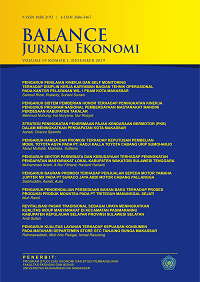The Success of the Social Assistance Program in Supporting the Economic Resilience of Poor Communities during the Covid-19 Pandemic
DOI: https://doi.org/10.26618/jeb.v20i1.12924
Social assistance, poor society/poverty, covid-19 pandemic
Abstract
Poverty is a multifaceted problem that impacts people's lives in many ways, such as socio-cultural, educational, religious, and economic. Poverty has increased as a result of the COVID-19 epidemic in various countries, including Indonesia. The Indonesian government has responded by introducing a number of social assistance initiatives to help those affected by the pandemic. The purpose of this study is to assess how well social assistance programs are helping the underprivileged maintain their financial stability during the COVID-19 pandemic. The study, conducted in Binjai City, Indonesia, centered on the Direct Cash Transfer (BLT) initiative. The findings of this study show that the social assistance program had a beneficial and lasting impact on the local economy of Binjai City. Increases in community consumption, demand for goods and services, production, employment, and economic growth demonstrate this.
References
Abd, F., & Kasnelly, J.S. (2020). Rising Unemployment Rates Amid the Pandemic (Covid-19). Al-Mizan: Journal of Sharia Economics . Volume 3, Issue 1, PP 45-60 .
Ahmad, Ahmad. (2018). Performance of the Smart Indonesia Program through the Smart Indonesia Card (Survey of 6 Provinces in Indonesia) . Journal of Economics and Management . Volume 19, Issue 1.
Hertati, Diana. (2011). Evaluation of the Cash Social Assistance Program (BST) Policy in the City of Surabaya (Study in Tambaksari District). Governance Journal. Volume 7, Issue 2, PP 99-110.
Huda, R.N. (2022). The Effect of Education on Poverty: Case Study in West Bandung Regency. Journal of Development Economics. Volume 24, Issue 1, PP 1-12.
Irfani, A., & Astika, N. (2021). Education and Poverty: A Literature Review. Journal of Economic Education . Volume Issue 2, PP 127-138.
Iping, B. (2020). Social Protection Through Direct Cash Assistance (Blt) Program Policies in the Covid-19 Pandemic Era: Review of Economic and Social Perspectives . Journal of Educational Management and Social Sciences. Volume 1, Issue 2, PP 516-526.
Prastowo, A. (2022). The Effect of Social Assistance Programs on Poverty Reduction in Indonesia. Journal of Development Economics. Volume 24, Issue 2, PP 203-214.
Prayogo, Dimas., & Sukim. (2021). Determinants of Indonesian People's Purchasing Power During the 2020 Covid-19 Pandemic. Official National Statistics Seminar. Volume 2021, Issue 1, PP 631-640.
Purwanto, EA (2007). Assessing the Potential of Small and Medium Enterprises for Making Anti-Poverty Policies in Indonesia. Journal of Social and Political Sciences. Volume 10.
Rahman, PA, Firman, & Rusdinal. (2019). Poverty in a Social Science Perspective. Tambusai Education Journal. Volume 3, Issue 6, PP 1542-1548.
Rizal, F., & Mukaromah, H. (2021). ISLAMIC PHILANTHROPY IS A SOLUTION TO THE PROBLEM OF POVERTY DUE TO THE COVID-19 PANDEMIC. Al-Manhaj: Journal of Islamic Law and Social Institutions. Volume 3, Issue 1, PP35-66.
Ruhyana, NF, & Ferdiansyah, H. (2020). Sumedang Regency Government Policy Strategy in Distribution of Social Assistance during the Covid-19 Pandemic. Journal of Intellectual Treasures. Volume 4, Issue 2, PP 788-804.
Sulhan, Muhammad, and Totok Sasongko. (2017). Implementation of Poverty Alleviation Program Policy through Social Insurance Cards and Smart Indonesia Cards in the Community (Case Study in Kauman Village, Malang City). Journal of Social and Political Sciences (JISIP). Volume 6, Issue 1.
Suryati, Desi., & Amini, R. (2021) Islamic Consumption Patterns During the Covid 19 Pandemic in Mataram City. Econetica Journal: Journal of Social Sciences, Economics and Business. Volume 3, Issue 1, PP 1-10.
Main, AW (2022). Economic Impact of the Social Assistance Program during the Covid-19 Pandemic. Journal of Economics and Business. Volume 23 Issue 1, PP 1-13.
BPS. http://sirusa.bps.go.id/index.php?r=indikator/view&id=44. SIRuSa.
BPS SIRuSa . https://sirusa.web.bps.go.id/
Fauzia, M. (2020). Impact of Corona, Poverty Rate Could Increase by 3.78 Million People. Kompas.Com .












